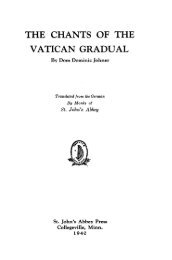William Byrd: A Celebration, edited by Richard Turget - MusicaSacra
William Byrd: A Celebration, edited by Richard Turget - MusicaSacra
William Byrd: A Celebration, edited by Richard Turget - MusicaSacra
Create successful ePaper yourself
Turn your PDF publications into a flip-book with our unique Google optimized e-Paper software.
“Blame Not the Printer”: <strong>William</strong> <strong>Byrd</strong>’s Publishing Drive, 1588–1591 — 23<br />
Lamentations or some of his later motets such as In ieiunio et fletu can fail to realize that he must<br />
have been deeply affected <strong>by</strong> the possibility of ordering technique in the service of new kind of<br />
expression. Of course, <strong>Byrd</strong> had <strong>by</strong> now gone beyond Tallis’s technical resources, rooted as<br />
these were in an earlier generation of English music as well as a perusal of the work of early sixteenth-century<br />
composers such as Gombert. The anger and intensity that Tallis builds up as he<br />
matches Jeremiah’s threnody for the fallen Jerusalem and the wonderful call for its return to the<br />
Lord might well have been unforgettable to <strong>Byrd</strong>.<br />
[Example 3: Lamentations II; see page 36]<br />
The most obvious interpretation of these words, “All her portals lie in ruins, and her priests<br />
cry in sorrow. Her virgins are defiled, and she is crushed with bitterness,” set to music of this<br />
powerful kind is that it results from the anger of one who sees his religion forsaken, a musical<br />
jeremiad for the contemporary situation in England. The initial disillusion for Roman Catholics<br />
like Tallis and <strong>Byrd</strong> was the Pope’s excommunication of Elizabeth I in 1570, the Ridolfi plot<br />
the following year, and the resulting pressure on Catholics. All this destroyed the illusion of an<br />
uneasy truce that the cautious queen might have sustained with Rome, and it forced Christians<br />
in England to take sides.<br />
The situation became more tense as the priests began to arrive from the English College<br />
abroad in what became the largely Jesuit-inspired mission to re-convert England. Parliament<br />
accordingly passed more and more repressive and punitive laws to counter the threat they<br />
posed. Early in the 1580s came the execution of the Jesuit Edmund Campion. A Catholic poem<br />
that circulated after this startling event met with stern censorship from the administration—its<br />
publisher had his ears cut off. <strong>Byrd</strong> included a setting of the first stanza, beginning “Why Do<br />
I Use My Paper, Ink, and Pen” in his 1588 songbook, together with two innocuous verses. No<br />
one who knew the poem could miss the reference.<br />
[Example 4: Why Do I Use My Paper, Ink, and Pen; see page 51]<br />
This daring act causes a kind of hiatus in the normally “cool” song form. For a moment<br />
here, and subsequently elsewhere, <strong>Byrd</strong> achieves almost declamatory rhetoric of a kind that<br />
becomes more usual in the seventeenth century, what the music history books call “baroque.”<br />
In the 1589 and 1591 Cantiones, however, passion spills out all over in the music that actively<br />
shapes an interpretation of the words. Just listen, for instance, to the declamatory passage with<br />
which <strong>Byrd</strong> begins the motet Haec dicit Dominus, another text from Jeremiah that in the context<br />
of the contents of the two books as a whole can be—almost demands to be—interpreted<br />
as a lament for the Catholic martyrs, as <strong>Byrd</strong> would have thought of them.<br />
[Example 5: Haec dicit Dominus: Vox in excelsis audita est; see page 53]<br />
Like this text, most of those which we take to refer to the contemporary situation are biblical.<br />
But so many of them have to do with the captivities of the Jews in Ba<strong>by</strong>lon or Egypt, with<br />
the Second Coming, or with dispossession or martyrdom that it was not difficult for Joseph<br />
Kerman, following arguments already made <strong>by</strong> H. B. Collins and others, to propose successfully<br />
that they addressed the plight of English Catholics in general, and those who favored the<br />
Jesuits in particular. 7<br />
7<br />
Kerman, The Masses and Motets, pp. 40–54; also ibid., “The Elizabethan Motet: A Study of Texts for Music,”<br />
Studies in the Renaissance, 9 (1962), pp. 273–308.
















